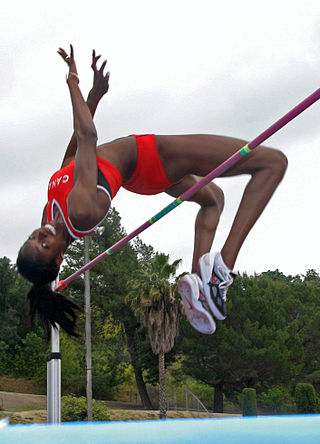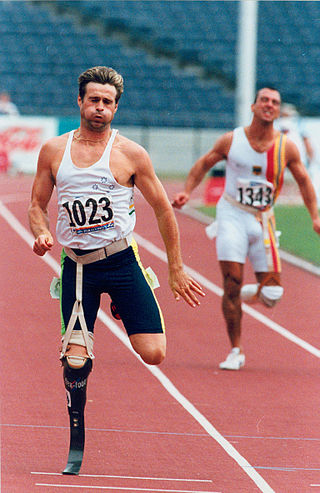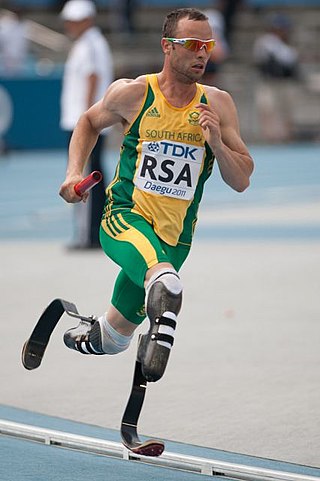
The high jump is a track and field event in which competitors must jump unaided over a horizontal bar placed at measured heights without dislodging it. In its modern, most-practiced format, a bar is placed between two standards with a crash mat for landing. Since ancient times, competitors have introduced increasingly effective techniques to arrive at the current form, and the current universally preferred method is the Fosbury Flop, in which athletes run towards the bar and leap head first with their back to the bar.

The long jump is a track and field event in which athletes combine speed, strength and agility in an attempt to leap as far as possible from a takeoff point. Along with the triple jump, the two events that measure jumping for distance as a group are referred to as the "horizontal jumps". This event has a history in the ancient Olympic Games and has been a modern Olympic event for men since the first Olympics in 1896 and for women since 1948.
Wojtek Czyz is a German Paralympic track and field athlete from Polish part of Silesia.

Oscar Leonard Carl Pistorius is a South African former professional sprinter. He was convicted of culpable homicide in the death of his girlfriend. Both of his feet were amputated when he was 11 months old as a result of a congenital defect; he was born missing the outside of both feet and both fibulas. Pistorius ran in both nondisabled sprint events and in sprint events for below-knee amputees. He was the 10th athlete to compete at both the Paralympic Games and Olympic Games.

John McFall is a British Paralympic sprinter, surgeon, and ESA Project astronaut. In November 2022, he was selected by the European Space Agency to become the first "parastronaut". ESA will do a feasibility study on him flying to space and what needs to be adapted for people with disabilities.

April Holmes is a Paralympic athlete from the USA competing mainly in category T44 sprint events.

Darya Igorevna Klishina is a Russian long jumper.

The World Para Athletics Championships, known as the IPC Athletics World Championships prior to 2017, are a biennial Paralympic athletics event organized by World Para Athletics, a subcommittee of the International Paralympic Committee (IPC). It features athletics events contested by athletes with physical disabilities. The first IPC Athletics World Championships were held in Berlin, Germany in 1994.

Alan Fonteles Cardoso Oliveira is a Paralympian athlete from Brazil competing mainly in category T44 sprint events. Oliveira is a double-below-the-knee amputee, classifying him in the Paralympic T43 class; athletes in this class run in T44 event.
T42 is a disability sport classification for disability athletics, applying to athletes with single above the knee amputations or a disability that is comparable. This class includes ISOD classified A2 and A9 competitors.
T43 is a disability sport classification for disability athletics, applying to athletes with "Double below knee amputation or similar disability." It includes ISOD classified athletes from the A4 and A9 classes.

T44 is a disability sport classification for disability athletics, applying to "Single below knee amputation or an athlete who can walk with moderately reduced function in one or both legs." It includes ISOD A4 and A9 classes.

The mechanics of the running blades used by South African former Paralympic runner Oscar Pistorius depend on special carbon-fiber-reinforced polymer prosthetics. Pistorius has double below-the-knee amputations and competed in both non-disabled and T44 amputee athletics events. Pistorius's eligibility to run in international non-disabled events is sanctioned by the International Association of Athletics Federations (IAAF).

Vanessa Low is a German-born Australian Paralympic athlete competing in T42 sprint and long jump events. Born in East Germany, she gained Australian nationality in June 2017.
T47 is a disability sport classification for disability athletics primarily for competitors with a below elbow or wrist amputation or impairment. T47 is a classification for track events but unlike the other T40 to T46 classifications it has no equivalent F47 classification for field events. The amputee sports equivalent class is ISOD the A8 class. People in this class can have injuries as a result of over use of their remaining upper limb.
A4 is an amputee sport classification used by the International Sports Organization for the Disabled (ISOD).for people with acquired or congenital amputations. People in this class have one leg amputated below the knee. Their amputations impact their sport performance, including having balance issues, increased energy costs, higher rates of oxygen consumption, and issues with their gait. Sports people in this class are eligible to participate in include athletics, swimming, sitting volleyball, archery, weightlifting, wheelchair basketball, amputee basketball, amputee football, lawn bowls, and sitzball.

Sarah Walsh is an Australian Paralympic amputee athlete. She represented Australia at the 2016 Rio Paralympics and 2020 Tokyo Paralympics in athletics.
Felix Streng is a German Paralympic track and field athlete. A single leg amputee, Streng competes in both sprint and long jump events, competing in the T44 classification. He has won medals at both European and World Championship level and was part of the German Athletics at the 2016 Summer Paralympics – Men's 4 × 100 metres relay team that won gold at the 2016 Summer Paralympics in Rio.

The 2018 World Para Athletics European Championships was a track and field competition for athletes with a disability open to International Paralympic Committee (IPC) affiliated countries within Europe, plus Azerbaijan and Israel. It was held in Berlin, Germany and took place between 20 and 26 August 2018 at the Friedrich-Ludwig-Jahn-Sportpark. 596 athletes from 35 countries competed during the championships.
Ntando Mahlangu is a South African Paralympic athlete. He won the gold medal in both the men's long jump T63 and men's 200 metres T61 events at the 2020 Summer Paralympics in Tokyo, Japan.














